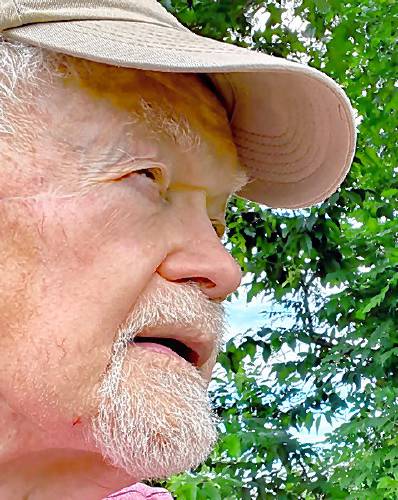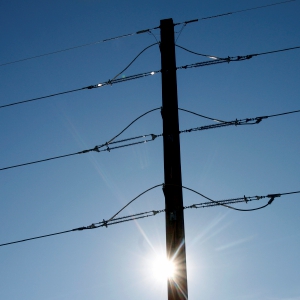Connecting the Dots: ‘Admit the abyss is real and truly may swallow us all’

John Bos FILE PHOTO
| Published: 12-08-2023 5:00 PM |
The ongoing denial campaign to undermine public trust in climate science has been described as a denial machine organized by industrial, political and ideological interests. This machine is supported by conservative and skeptical media to manufacture uncertainty about our climate crisis. Those promoting climate denial commonly use rhetorical tactics to give the appearance of scientific controversy where there is none.
All the charts, illustrations and photographs of our ravaged planet cannot “simplify” the impact of complex scientific findings into easily understood pictures. I agree with fellow Recorder columnist Jon Huer who, in his Dec. 2 column, wrote it’s becoming a national habit to use images in attempts to convey complex ideas. But, for me, there’s no way in the world that images can communicate complex thoughts, feelings and a whole other range of existential “messages.”
Huer is right that the power of an image can remind the viewer of momentous events. Like the planes crashing into the Twin Towers. But only the words by survivors recorded for the 9/11 Memorial Museum can begin to describe their personal experience.
A closer-to-home example of the power of words over images is Ruth Charney’s recent column “What can I do?” that ran along side of Huer’s column on Dec. 2. Her heart-rending examination of the phrase “What can I do?” as a disappearing value in “our broken world” cannot be expressed in an image.
Back to climate denial … I find poet Jane Hirshfield’s simple words in “Let Them Not Say” one of the most powerful, bone-baring assemblage of words about climate denial I have ever read.
Let them not say: we did not see it.
We saw.
Let them not say: we did not hear it.
Article continues after...
Yesterday's Most Read Articles
We heard.
Let them not say: they did not taste it.
We ate, we trembled.
Let them not say: it was not spoken, not written.
We spoke,
we witnessed with voices and hands.
Let them not say: they did nothing.
We did not-enough.
Let them say, as they must say
something:
A kerosene beauty.
It burned.
Let them say we warmed ourselves by it,
read by its light, praised,
and it burned.
What grabs me is the powerful finger-pointing in Hirshfield’s poem and how she makes the poem’s “them” somewhat ambiguous in its reference to the deniers of our climate catastrophe. We are all, in one way or another, “them.” It’s inescapable message fuels my sense of despair that we, the people, will never do what has to be done. Because doing what has to be done requires so much from everyone.
“The spare lyricism here, a piercing directness and clarity, is pure Hirshfield” wrote climate activist Wen Stephenson in The Nation magazine. “And yet there’s something else, too, a stark reckoning, a depth of anger, an incalculable grief, an ending, an abyss. This felt new to me,” says Stephenson.
“I’m no stranger,” Stephenson continued, “to the mood of grief and doom that has settled like smoke-haze over so many of us who pay attention to climate science and our ecological and political catastrophes. As a journalist and an activist, having fought pipelines and blockaded coal trains, I’ve stared straight into that abyss for nearly a decade and a half. I know despair; we’re on intimate terms, and I won’t be shamed for it. (We’re told it’s a sin.) You can’t run from it — you may think you can, but it catches up with you.”
In response, Hirshfield wrote to Stephenson saying, “I actually believe in despair,” “though it’s possible that what I mean by that word is not what the despair-condemners mean by it. They mean: the collapse to nihilism, paralysis, Nero-ism. I mean something like: admit the abyss is real and truly may swallow us all, because only then will we do whatever we can to prevent it. Perhaps this isn’t despair, in the strictest sense. Perhaps despair is a full giving up. But for me it feels like despair: an unbearable pitch into falling and darkness. In my experience, only the full admission into heart and mind of the depths of foreseeable collapse is sufficient as a spur to not giving up. And to not being complacent, to not assume that others, somehow, will take care of the problem for us.”
Discussing the fear of climate and political despair, Jane Hirshfield said “Two or three years ago, I noticed there was this great turn, and people who’d been talking about how bad things are getting decided they had to start talking and writing about hope.”
Greenfield resident John Bos has written about our climate crisis on and off for the past 10 years in the Recorder and Green Energy Times but not with the eloquence of Jane Hirshfield. Comments and questions are invited at john01370@gmail.com.

 My Turn: No good answers with utilities in control
My Turn: No good answers with utilities in control My Turn: Blame Hamas for the suffering of Palestinians
My Turn: Blame Hamas for the suffering of Palestinians Ahmad Esfahani: Democratic lagging
Ahmad Esfahani: Democratic lagging Evlyn Ashong-Katai: Back tax fund for elderly, disabled
Evlyn Ashong-Katai: Back tax fund for elderly, disabled
